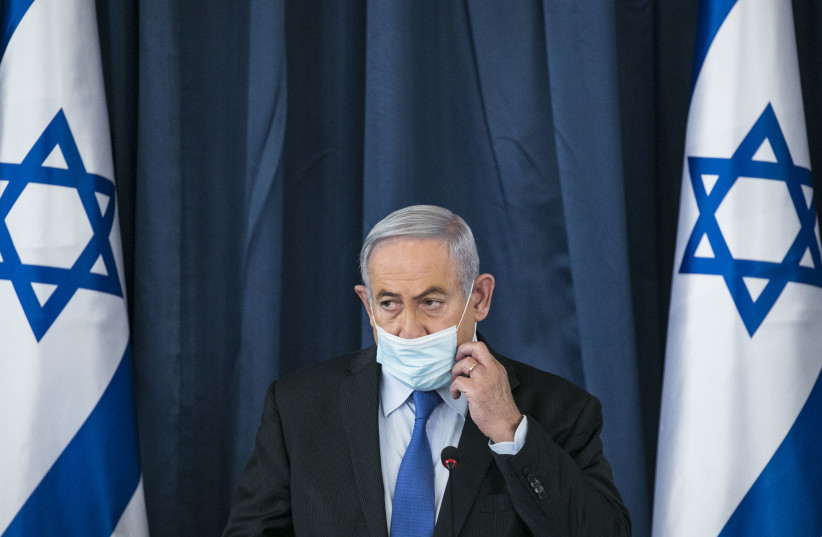Timing of when witnesses will be called is considered crucial

By Saturday night, it was clear there would be no last-minute emergency coronavirus announcement to delay Sunday morning’s second hearing in the bribery trial of Prime Minister Benjamin Netanyahu.
After Netanyahu managed to delay his first hearing from March 17 until May 24 with an emergency coronavirus shutdown of most of the courts, there had been speculation of a potential delay up until the last minute.
Just as the indictment against Netanyahu – represented by Amit Hadad, and recently added lawyer Yossi Segev – was a major cause of the 18-month election-deadlock, the trial will hover as a cloud over virtually all major government decisions for the foreseeable future.
Picking up from the opening hearing on May 24, this hearing is supposed to be decisive in setting the schedule for when the Jerusalem District Court will start hearing witnesses as well as how many hearings will be held per week.
The prosecution reportedly would like four per week, while the defense reportedly will request two per week.
Whether the trial takes one year or multiple years could have a huge impact on Netanyahu’s transfer of power to Blue and White’s Benny Gantz in November 2021 as well as what Netanyahu’s status will be after that.
The other defendants are Bezeq and Walla owner Shaul Elovitch and his wife Iris (represented by Jacques Chen), as well as Yediot Ahronot owner Arnon “Noni” Mozes (represented by Navit Negev).
Netanyahu himself physically attended the May 24 hearing to respond to the indictment, but is not required to attend Sunday’s hearing, which is more about scheduling and resolving legal disputes between the lawyers over evidence.
The defense will also try to convince the court to allow it to attack basic aspects of the case, such as some of the prosecution’s deals with state witnesses, before the main part of the trial opens up.
There is still a question mark about whether lawyer Boaz Ben Tzur will join Netanyahu’s defense team since he has been representing a key witness in Case 1000 for the prosecution until now.
The lead judge for the case and who will run Sunday’s hearing is Judge Rivka Friedman-Feldman.
The remaining judges for the trial are Moshe Bar-Am and Oded Shaham.
Deputy State Attorney Liat Ben Ari, Tel Aviv Economic Crimes Division Deputy Chief Yonatan Tadmor and Securities Crimes Chief Yehudit Tirosh represent the prosecution, while at least one defense lawyer for each additional defendant besides Netanyahu will also be present.
Due to corona social distancing, there is limited space in the main courtroom, so there will be additional defense lawyers for the defendants, media and other related professionals involved, in adjacent rooms with closed-circuit TV.
Netanyahu’s legal team has not formally announced whether Hadad or Segev will take the lead at Sunday’s hearing, but until now Hadad has been the junior lawyer on the team.
In May, lawyer Micha Fettman argued on Netanyahu’s behalf.
However, Fettman, like a long list of prior Netanyahu lawyers, quit the team last week over conflicts with Netanyahu regarding payment.
The payment controversy blew up after Netanyahu’s request to receive NIS 10 million in donations from tycoon ally Spencer Partrich was rejected by the State Comptroller Committee in charge of vetting gifts to public servants.
Hadad has been with Netanyahu since the start of the case back when the lead lawyer was Hadad’s then-boss, Jacob Weinroth, but many other lawyers have been on and off of the team since Weinroth passed away in 2018.
Mandelblit announced on November 21, 2019 that he would indict Netanyahu for bribery in Case 4000, the Bezeq-Walla Affair, for breach of public trust in Case 1000, the Illegal Gifts Affair, and for breach of public trust in Case 2000, the Yediot Aharonot-Israel Hayom Affair.
Due to fights over potential immunity, the Netanyahu indictment was not filed until January 28, and due to the election and the coronavirus crisis, the trial’s start date was delayed by several months.
In Case 4000, Netanyahu is accused of involvement in a media bribery scheme in which Walla owner Shaul Elovitch allegedly gave him positive coverage in exchange for Netanyahu making government policies favoring Elovitch’s Bezeq company to the tune of around NIS 1.8 billion.
This is the hardest case for Netanyahu, since he faces accusations by two close former aides turned state witnesses, Shlomo Filber and Nir Hefetz.
In Case 1000, Netanyahu is accused of receiving hundreds of thousands of shekels in gifts from rich tycoons, mostly from Arnon Milchan, in exchange for help with business and personal-legal initiatives.
The charge itself is for acting in situations in which the prime minister had a conflict of interest, since no actual quid pro quo can be proven.
The absence of a quid pro quo makes this case much weaker than Case 4000, but it is still viewed by most legal scholars as having at least a 50/50 chance.
Regarding Case 2000, Netanyahu was accused of working with Yediot and Israel Hayom to reduce the latter’s competition with Yediot in exchange for positive coverage for Netanyahu.
The deal never went through, but the law has crimes of attempted bribery and breach of trust which can apply even if a deal does not go through.
Mandelblit was never a fan of Case 2000, but decided he needed to charge Netanyahu with something once they indicted Yediot owner Arnon “Noni” Mozes with bribery.
As reported by The Jerusalem Post
